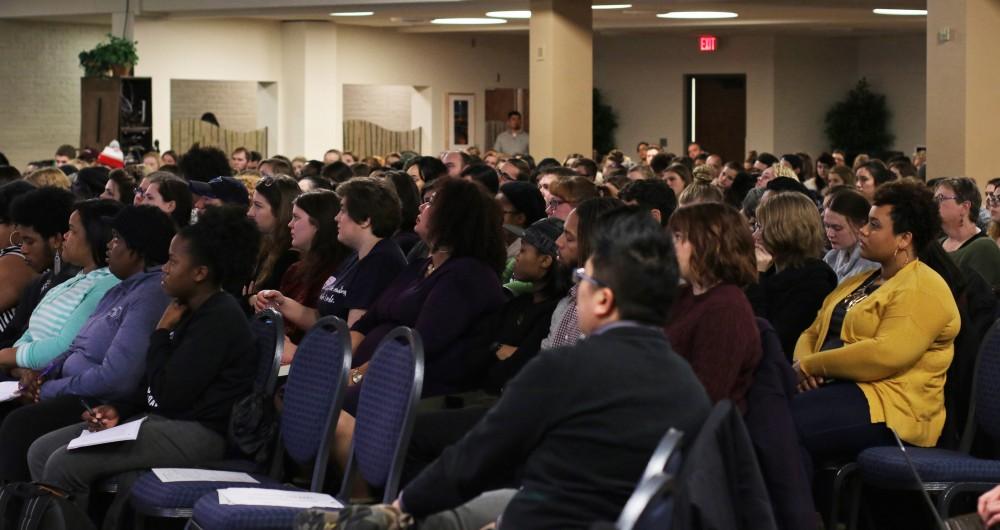Civil rights advocate Kimberlé Crenshaw discusses King’s legacy of breaking conventions

GVL/Meghan McBrady – Kimberle Crenshaw, professor of law at UCLA and Colubmia Law School, speaks to the crowd gathered inside Kirkhof’s Grand River Room on Wednesday, Jan. 18, 2017.
Jan 19, 2017
Throughout the MLK Commemoration Week, the Grand Valley State University community engaged in social justice activities and discussions which emulated King’s ideals of equality and embracing diversity in all of its forms.
Bringing Kimberlé Crenshaw, a Civil Rights advocate, to speak at GVSU Wednesday, Jan. 18, to highlight and celebrate Martin Luther King Jr’s legacy allowed a dissection of justice and democracy post the civil rights Movement.
“I want to tell you that this is a challenge at this point,” she said. “This is a sort of ritual now across the country on Martin Luther King Day in which we honor not only his legacy but the right of the social justice movement that his legacy embodies and we have done now for almost half-a-century.”
Crenshaw, also a professor of law at the UCLA School of Law and Columbia Law School, with her specialty lying in race and gender issues. She capitalized during her presentation “American Democracy: Revolutionizing Our American Myths,” how a society can lift up King’s legacy, there must be a willingness to break conventions and have uncomfortable conversations – even on a day that celebrates his legacy.
About 550 participants, which was made up of GVSU’s faculty, staff and students, listened to Crenshaw’s talk at 4:30 p.m. on the Allendale Campus in the Kirkhof’s Center’s Grand River Room and as part of a simulcast at the DeVos Center’s Loosemore Auditorium at the Pew Campus.
Jesse Bernal, the vice president of inclusion and equity at GVSU, spoke before Crenshaw’s talk and noted how the university tries to adopt various initiatives and efforts to engage and support the community.
“Our work to create a truly inclusive and equitable campus and to mitigate the impact of what we know as part of the story against discrimination and marginalization in both in education and society at large is held heavily and worn by theory,” he said.
Highlighting her theory of intersectionality and the critical race theory, which emphasizes seeing relationships between race, gender, sexual orientation and class, Crenshaw’s talk stressed even though this is a celebration of King’s legacy, there still needs to be a talk about the politics and issues currently happening in society.
“The (Martin Luther King Jr.) Commission said this should be an occasion for us to come together and celebrate the dream of equality, rather than the realities of inequality,” she said. “It’s been like this for decades and it might still be this way were not for the fact that white supremacy has taken off its cloak and it has boldly assumed a seat at the table of political power.”
“Unvarnished, unapologetic and fully empowered to end once and for all what’s left of Dr. King’s legacy.”
Beyond discussing Plessy v. Ferguson (1896), which upheld state racial segregation laws for public facilities as “separate but equal,” to #SayHerName, which addresses police violence against black women, Crenshaw also talked about structural racial inequality and how society is in a battle for the future.
Post-racialism, she said, did not deliver the country to a place in 2016 where racism is no longer a problem. Understanding then, she said, that waiting for a time for change is not enough as everyone needs to stand up for justice in order to be against the politics of injustice.
“Human progress never rolls in on the wheels of inevitability,” King said his ‘Why We Can’t Wait’ speech. “It comes through the tireless efforts of men willing to work to be co-workers with God, and without this hard work, time itself becomes an ally of the forces of social stagnation.”
“We use time creatively, in the knowledge that the time is always ripe to do right.”





















